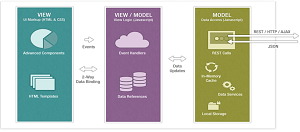News
Oracle Turns to JavaScript in New Cloud Dev Tools
- By David Ramel
- October 27, 2015
While still working to enhance that Java thing, Oracle Corp. is evolving with the times, today adding JavaScript functionality to a bevy of cloud-based development services and products.
Targeting business users as well as developers, Oracle in the midst of its OpenWorld 2015 conference embraced JavaScript in brand-new and improved developer-oriented frameworks, services and toolkits, making it a first-class citizen along with its mainstay Java language.
The once-lowly scripting language has seen a resurgence of late, being put to new uses with new ideas, techniques and technology that have taken it far beyond its roots as a means to add functionality and interactivity to Web sites. JavaScript was recently identified as the most popular programming language used on the GitHub code repository, followed by -- of course -- Java. In fact, the 20-year-old JavaScript was recently named "programming language of the year" by one popularity index.
Now, in the face of that resurgence, it's receiving first-class treatment from Oracle, which became owner of the Java language when it acquired Sun Microsystems Inc.
"While Java continues to be the most popular development language in the world, JavaScript has become the second most popular language with a growing developer base utilizing it for both server and client-based functionality," Oracle said in a statement today announcing its embrace of JavaScript in its development tooling. "Many organizations are leveraging a combination of these languages in their application development efforts. To address these needs, Oracle offers a comprehensive set of services, toolkits and development frameworks that enable organizations to apply developers' skills across these technologies, to deliver nearly any type of application, including enterprise apps, lightweight container apps, Web apps and mobile apps."
Leading those products is the Oracle JavaScript Extension Toolkit, a homegrown set of libraries used by internal developers working on the company's cloud products. Now Oracle is offering the technology to customers, providing functionality via the JavaScript libraries that can be used independently or in a modular way to enhance existing JavaScript technology stacks.
 [Click on image for larger view.]
The Oracle JavaScript Extension Toolkit Supports the MVVM Architectural Design Pattern (source: Oracle)
[Click on image for larger view.]
The Oracle JavaScript Extension Toolkit Supports the MVVM Architectural Design Pattern (source: Oracle)
"The toolkit offers enterprise-ready features lacking in existing JavaScript frameworks and libraries, including accessibility and internationalization support for its rich set of UI components," the company said. "Oracle JavaScript Extension Toolkit also offers a rich set of data visualization components, an advanced routing system for single-page applications, common two-way data binding with simplified integration with services over a variety of protocols, and smart resource management for lighter applications."
According to Oracle's "Welcome to Oracle JET" Web site, the Oracle JavaScript Extension Toolkit supports the Model-View-ViewModel (MVVM) architectual design pattern and uses modern JavaScript, CSS3 and HTML5 design and development principles in the form of the aforementioned Oracle libraries and open source libraries such as JQuery, JQuery UI, Knockout, RequireJS and Hammer.
JavaScript is also interwoven through many other Oracle services and development tools, including the new Oracle Application Container Cloud, a new Platform-as-a-Service (PaaS) offering that leverages Docker container technology. It includes the Java SE Cloud Service and the Node Cloud Service. The latter is "optimized to run JavaScript-based server-side functionality using the popular Node JS platform," Oracle said. "This offering includes support for popular Node frameworks and npm modules like Express, underscore and passport."
Oracle also extended another PaaS offering, the Oracle Developer Cloud Service, which now includes support for JavaScript, being added to the existing Java and Java Enterprise Edition functionality.
"Oracle Developer Cloud offers full development lifecycle support covering requirements tracking, team management, Git code versioning, code review functionality, collaborative wikis, continuous integration automation and deployment services," Oracle said. "Oracle is also launching cloud-based IDE functionality as part of this service, supporting browser-based coding in the cloud for both Java and JavaScript."
Not forgetting Java, Oracle also announced new versions of its frameworks for that language, including the Oracle Application Development Framework and the Oracle Mobile Application Framework. The former targets Java-based Web development, with extended support to create responsive UIs and the publication and consumption of REST/JSON services. The mobile app framework, meanwhile, is aimed at on-device apps running on multiple mobile OSes, adding functionality designed to increase the performance of iOS and Android apps, sporting new UI capabilities and other features.
Oracle also announced simplified PaaS solutions for business users, including the Oracle Application Builder Cloud Service that lets non-coders easily create Web apps via a browser-based environment, and Oracle Mobile Application Accelerator, another browser-based tool that uses services from the Oracle Mobile Cloud Service to help business analysts create on-device mobile apps.
"With these new offerings, Oracle extends its commitment to both Java and JavaScript developers, as well as to business users, providing added choice and flexibility to accelerate application development, delivery and deployment for polyglot software development ecosystems," Oracle said.
About the Author
David Ramel is an editor and writer at Converge 360.